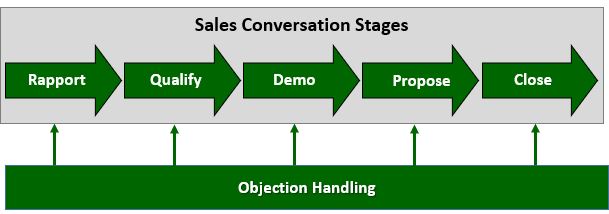Should Sales Assessments Focus On Salespeople’s Personalities or Sales Conversation Execution?
Traditional sales assessments evaluate the cognitive thinking, behaviors, motivation, communication style, leadership potential, and sociability of salespeople. There are thousands to pick from. Some of my favorites include Predictive Index, Birkman, and Meyers Briggs (MBTI).
When used to evaluate entire sales teams, these traditional sales assessments typically lead to:
- Recommendations to hire better salespeople, coach them, conduct sales training, and change your compensation plan.
- Valuable human resource insights that help drive company culture.
- Better relationships between salespeople, their peers, and buyers.
But do these insights, recommendations, and improved relationships lead to better execution of sales conversations and revenue results? It’s safe to say, no.
Why Are Traditional Sales Assessments Not Leading To Better Sales Conversation Results?
The answer is pretty straightforward. Traditional assessments do not evaluate how salespeople execute sales conversations. Therefore, they do not pinpoint the challenges faced by salespeople during sales conversations. In fact, they often distract salespeople which wastes time, money, and morale.
In simple terms, after completing traditional sales assessments and improvements salespeople continue to struggle during sales conversations with:
- Jumping from topic-to-topic and point-to-point.
- Over-explaining (talking too much) or under explain things.
- Forgetting what to say and not to say.
- Prematurely ending sales conversations to find answers.
- Over or understating company capabilities.
- Using jargon, buzzwords, and language that confuses buyers.
- Becoming confused when buyers change the subject.
- Paying limited attention to what buyers are saying.
- Frequently losing their place in conversations with buyers.
- Using sales presentations that confuse buyers.
So, you can have great improvements in cognitive thinking, behaviors, motivation, communication style, leadership potential, and sociability. But this does not equate to improvements in the execution of sales conversations. From a sales and revenue improvement perspective traditional sales assessments are important. But they are secondary to helping salespeople overcome the challenges they face during sales conversations.
The first priority is to enable salespeople to execute sales conversations with precision from sales conversation-to-conversation. With precision being defined as effective, efficient, and predictable.
What Should Sales Assessments Evaluate About Sales Conversation Execution?
To answer this question, we shifted from focusing on salespeople’s personalities, to focusing on how they execute sales conversations. We started by asking a series of questions to get business leaders, sales managers, and salespeople on the same page. First, what is the goal of a sales conversation? We believe the goal is to reach shared understandings and agreements that preferably result in the buyer purchasing.
Second, what is required for the buyer and seller to reach shared understandings and agreements? In simple terms, there is an exchange of information where the:
Buyer works to:
- Define and articulate their situation, problems, and priorities.
- Quantify the financial reason(s) to solve the problem.
- Identify potential solutions.
- Evaluate and compare competing solutions.
- Make a yes/no purchase decision.
Seller works to:
- Build rapport and qualify buyer problems, needs, and wants.
- Demonstrate and explain products, services, applications, and value propositions.
- Present recommendations and proposals.
- Negotiate and close the sale.
- Handle objections at any point during the exchange of information.
Third, What Tasks Do Salespeople Perform During The Exchange of Information With Buyers?
To answer this question, we observed and listened to thousands of sales conversations in five industry groups:
- Software, information, and publishing
- Professional service firms i.e. accounting, engineering, environmental
- Agencies i.e. insurance, financial, real estate
- Franchises
- Manufacturers and distributors
We observed salespeople struggling to execute ten key tasks during the exchange of information with buyers:
- Getting and keeping the buyer on the same page throughout all stages of the sales conversation
- Validating assumptions about what buyers a) know and don’t know about the seller’s company, offerings, and differentiation, b) value when determining if a vendor/partner is worthy of doing business with, and c) want to discuss now versus later.
- Sequencing and accurately presenting the right questions and answer options at the right time to: a) understand the buyer’s situation, b) define and prioritize buyer problems, wants, and needs, c) clarify the impact the problems are having, and d) establish an economic reason for solving the problem.
- Answering questions about products, services, applications, and competitors that buyers know to ask and don’t know to ask.
- Instantly accessing and sharing information including a) presentations, b) demonstrations and comparisons, c) pricing and discounts, d) case studies and testimonials, and e) product and service information sheets.
- Presenting recommendations and proposals including a) preparing solution options, b) pricing and discounts, and c) terms and conditions.
- Testing buyers for understanding and agreement at each stage of the exchange of information.
- Switching roles between a) talking, viewing, and listening, b) interpreting and preparing responses, c) searching for information and documents.
- Mitigating differences with buyers including a) frames of reference and assumptions, b) language and terminology, c) knowledge and experience, d) the timing of decisions, e) personal agendas and priorities, and f) personality styles.
- Remembering to apply a) selling skills and methods, b) company policies and procedures, c) best practices, and d) legal compliance measures.
So, this helps to explain why the insights, recommendations, and improved relationships
Conducting Sales Assessments Of Salespeople’s Ability To Execute Sales Conversations
Unfortunately, we could not find a sales assessment that evaluates the execution of sales conversations. Those that we found did not address the ten tasks that salespeople struggle with during sales conversations. So, we built one that addresses three things.
First, it evaluates how salespeople facilitate the exchange of information with buyers at all stages of a sales conversation.
Second, it evaluates the level of precision with which salespeople execute the ten key tasks they perform during sales conversations. Precision is defined as – – effectiveness, efficiency, and predictability.
Third, it provides multiple levels of assessment. This enables a simple or more in-depth understanding of sales conversation execution including:
- Level 1 Self-assessment where one or all your salespeople take an online sales conversation assessment. You can invite sales managers and business leaders to take the self-assessment. This provides 360-degree feedback.
- Level 2 Individual Interview(s) to clarify responses from the self-assessment. This provides a safe environment for salespeople to share more candid answers.
- Level 3 Focus Group(s) to engage small group discussions with small groups with salespeople or sales managers. This enables them to provide more candid answers and it fuel peer discussion around the issues.
- Level 4 Document Review to determine how sales, marketing, product, and other information is structured. In many cases training materials, sales playbooks, FAQs, sales presentations, sales scripts, training materials, and other documents create problems during sales conversations.
What Impact Does A Sales Conversation Assessment Have?
We found multiple impacts including:
- Business Leaders being able to stop wasting time, money, and morale on solutions that distract salespeople from selling.
- Sales Managers being better equipped to articulate what is blocking salespeople during sales conversations.
- Salespeople facilitating the exchange of information with buyers with precision.
- Human Resources having a more accurate assessment for screening sales job candidate’s.
- Product Managers understanding the information salespeople need to better facilitate the exchange of information with buyers.
A Positive Impact On Company Culture, Morale, and Diversity
We found that salespeople have many concerns about traditional sales assessments. First, they’re concerned that traditional sales assessment results will be used against them. Despite being reassured, these assessments make them feel like their character is being unfairly judged.
Second, they’re concerned that diverse thoughts, behaviors, communication styles, social styles, and leadership styles are not welcome. One salesperson summed it up this way “if management valued diversity, why are they using sales assessment information to hire salespeople that have similar styles?”
We found the opposite to be true when using a sales conversation assessment tool. Salespeople feel liberated and energized. They appreciate the focus on the challenges they face when facilitating the exchange of information with buyers during sales conversations. Many will state that the assessment results demonstrate what they have been trying to tell management for years. Here’s one of our favorite quotes, “give us better tools and information for facilitating the exchange of information with buyers. Then let us do our job without judging our character.”
Conclusion
To improve revenue results, focus first on evaluating your salespeople’s ability to execute sales conversations. Help them overcome the challenges they face when facilitating the exchange of information with buyers. This will mitigate many, if not all cognitive thinking, behavioral, motivation, communication style, leadership potential, and sociability challenges your sales team faces.
If it doesn’t, then conduct a traditional sales assessment.
Please Take a Minute To:
- Write a comment on this post
- Click Here to watch a video about sales conversation assessments
- Share this blog with other sales leaders, salespeople, CEO’s and investors
It’s time to bring precision – – effectiveness, efficiency, and predictability – – to sales execution.






